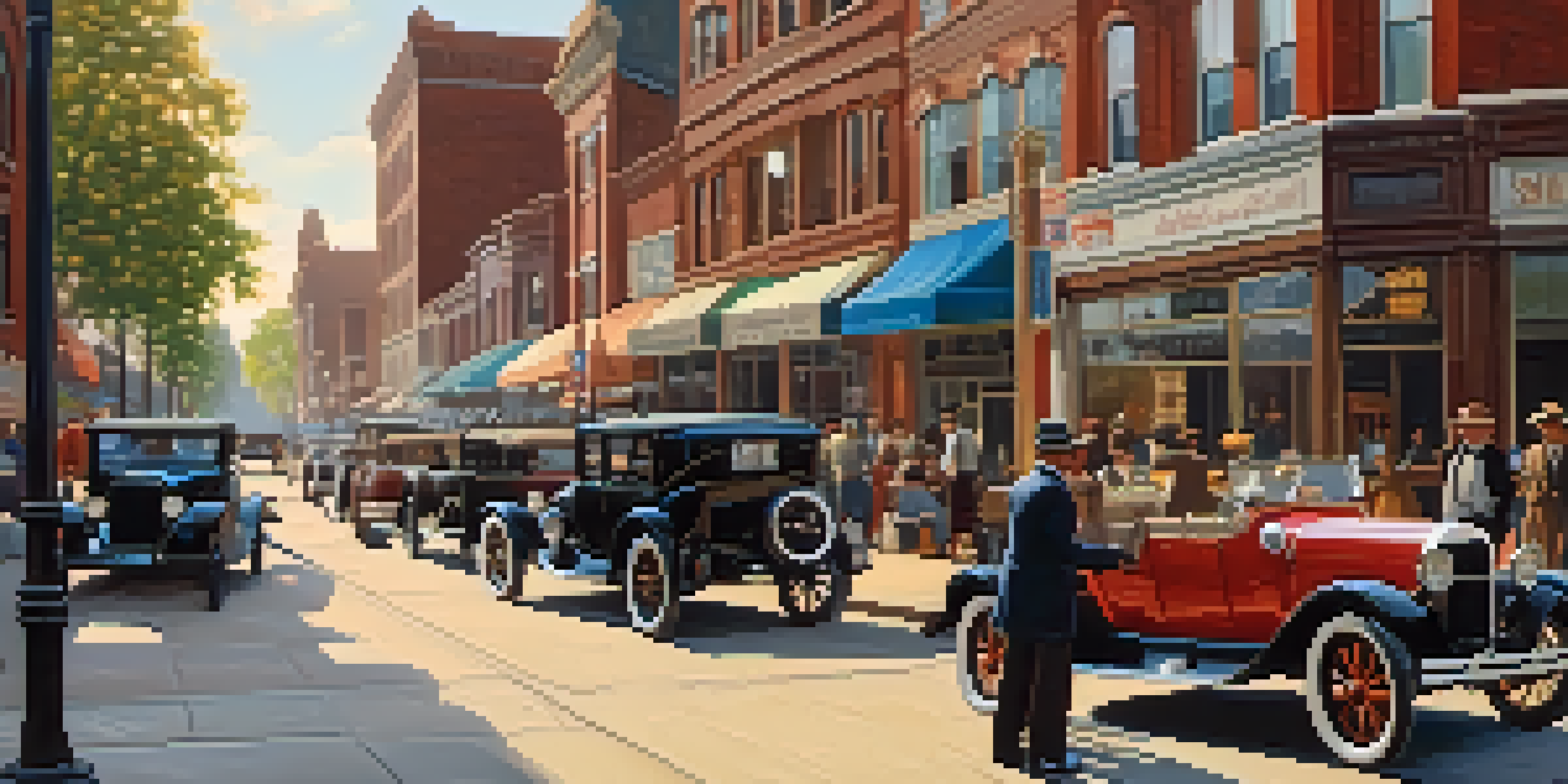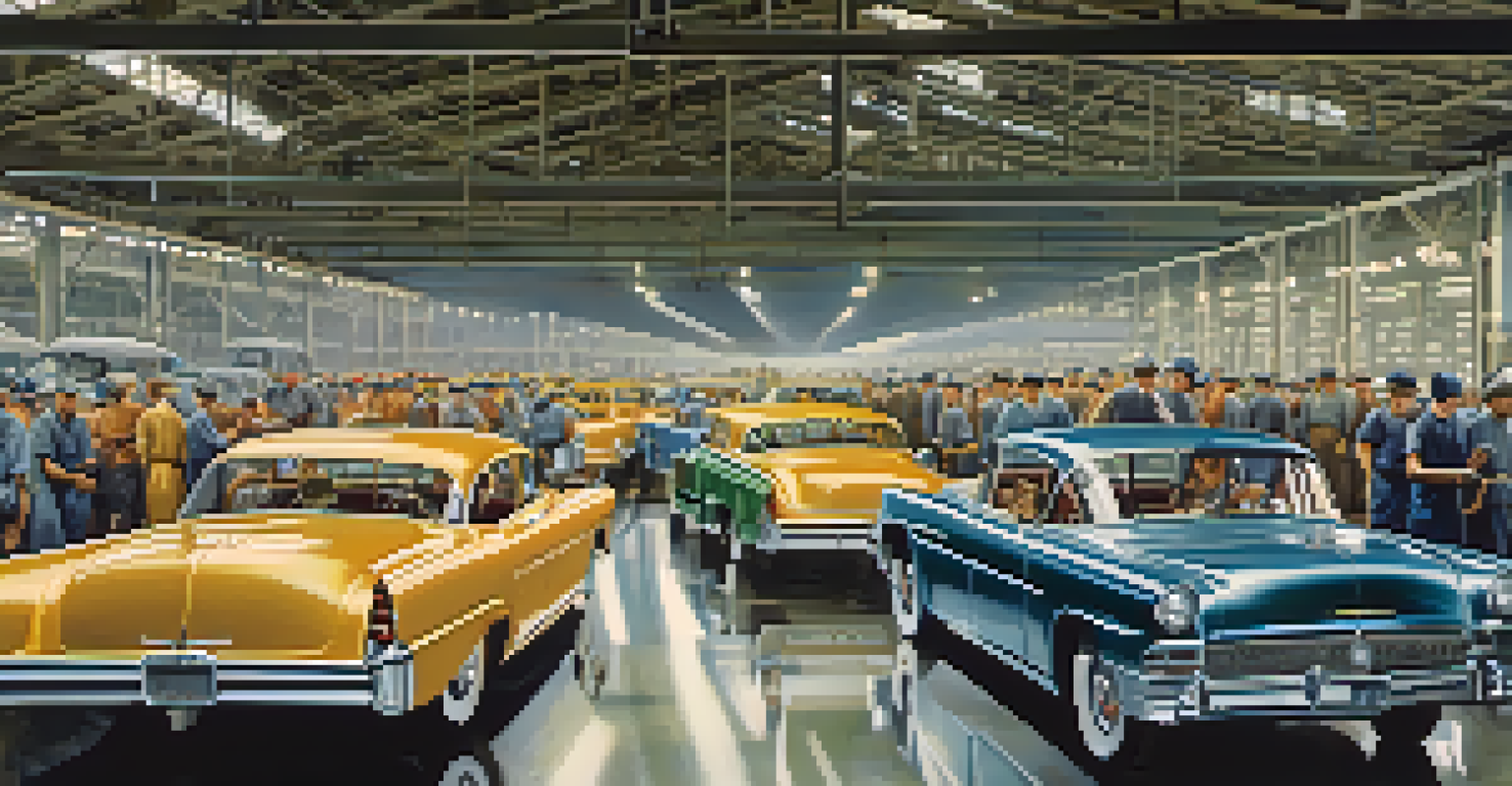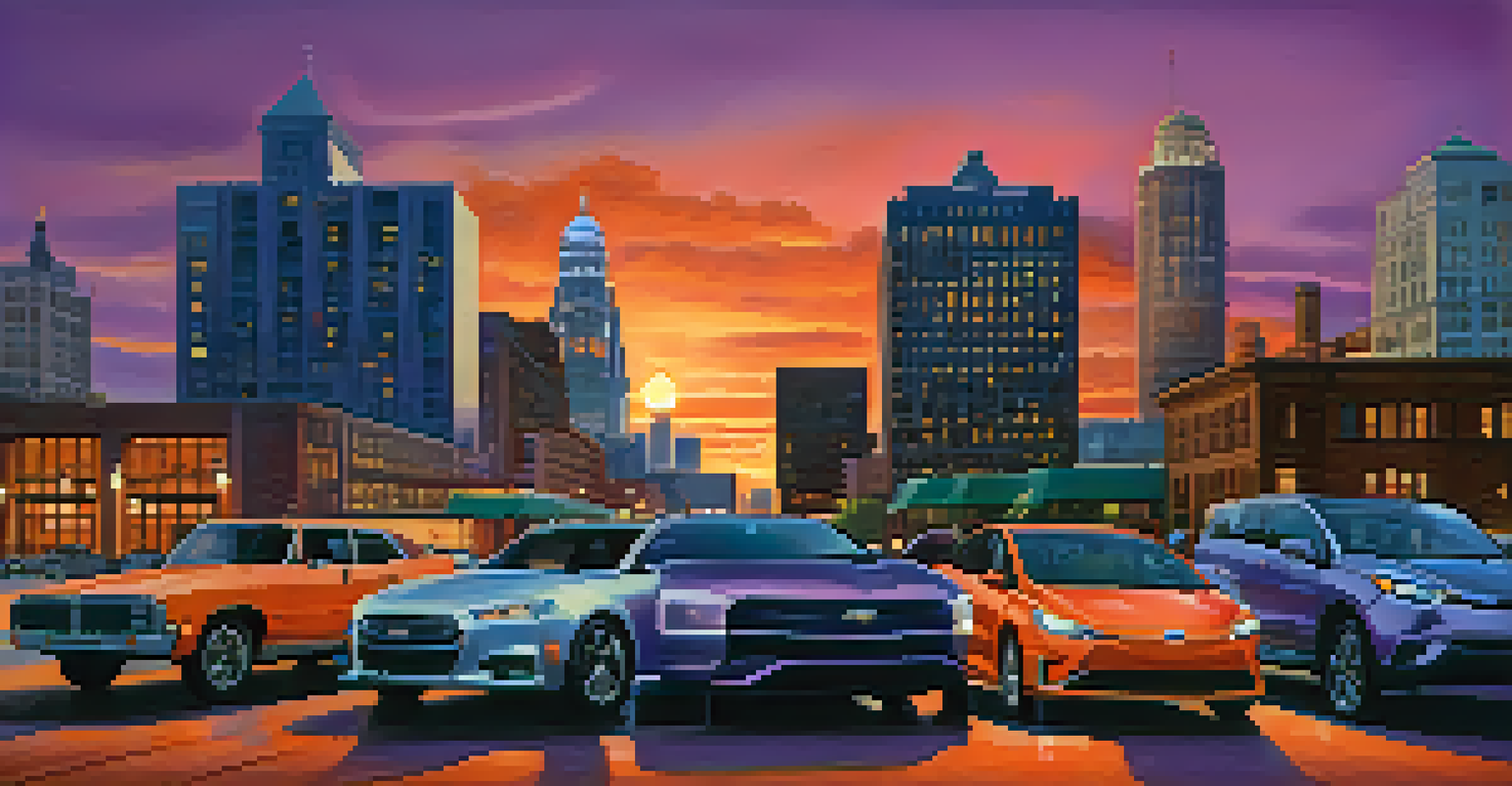The Rise and Fall of Detroit’s Auto Industry: A Historical View

Detroit's Origins: Birthplace of the American Auto Industry
Detroit's journey as the heart of the American auto industry began in the late 19th century. Innovators like Henry Ford and his revolutionary assembly line techniques transformed vehicle production, making cars affordable for the average American. This era marked a significant shift in not only transportation but also the economy, as jobs flourished and the city expanded rapidly.
The automobile is the greatest, most powerful, and most useful tool ever invented by man.
By the early 20th century, Detroit was at the forefront of automobile manufacturing. The city became a magnet for talent, drawing workers from across the nation, eager to be part of an industry that seemed to promise a bright future. This boom established Detroit as a cultural and economic hub, where dreams of prosperity were driven by the roar of engines.
As demand for automobiles surged, Detroit solidified its reputation globally. The iconic Motor City became synonymous with innovation, quality, and craftsmanship, leading to the creation of legendary brands like Ford, General Motors, and Chrysler. This era set the stage for a unique relationship between the city and its automotive industry, one that would shape Detroit's identity for decades.
The Golden Age: Peak Prosperity in the Auto Industry
The mid-20th century marked the golden age of Detroit's auto industry, where production reached unprecedented levels. With the introduction of new models and technological advancements, the Big Three automakers dominated the market, capturing global attention. This period was characterized by thriving jobs, burgeoning suburbs, and a lifestyle that revolved around the automobile.

During this time, the city witnessed a cultural renaissance fueled by the prosperity of the auto industry. Music, art, and social movements flourished, reflecting the energy of a city filled with ambition and creativity. Classic cars became symbols of status and freedom, forever changing the American landscape.
Detroit: Birthplace of Auto Innovation
Detroit emerged as a global leader in the auto industry through innovations like the assembly line, shaping both its economy and culture.
However, while the industry thrived, underlying tensions began to emerge. Labor strikes, racial inequality, and competition from foreign manufacturers hinted at challenges on the horizon. The golden age, while vibrant, began to show signs of vulnerability, foreshadowing the tumultuous times ahead.
Emerging Challenges: The Competition Begins
As the 1970s approached, Detroit's auto industry faced increasing competition from foreign manufacturers. Brands like Toyota and Volkswagen offered fuel-efficient and affordable cars, appealing to a changing consumer base. This shift began to erode the market share of American automakers, leading to a crisis of confidence in the industry.
Success is not just about what you accomplish in your life, it's about what you inspire others to do.
Moreover, rising production costs and economic downturns exacerbated the situation. The oil crisis of the 1970s forced consumers to rethink their vehicle choices, as gas prices soared and fuel efficiency became a priority. Detroit's automakers struggled to adapt, caught between their traditional production methods and the need for innovation.
The challenges of this era served as a wake-up call, prompting a reevaluation of strategies. Automakers began to invest in research and development, trying to reclaim their position in the market. However, the road ahead was fraught with obstacles that would ultimately lead to deeper issues for the industry.
The 1980s Crisis: A Turning Point for Detroit
The 1980s proved to be a pivotal decade for Detroit's auto industry, marked by significant layoffs and plant closures. The Big Three faced mounting pressure from foreign competitors and a changing economy, leading to a loss of jobs and a decline in production. This period saw the first signs of a city grappling with the fallout of its once-thriving industry.
In addition to economic challenges, the industry also faced criticism for its environmental impact. Growing awareness of pollution and energy consumption prompted calls for cleaner, more sustainable practices. This shift required automakers to rethink their approach, leading to innovations but also exposing the industry’s lag in responsiveness.
Challenges Amidst Prosperity
Despite its golden age, Detroit's auto industry faced increasing competition and economic pressures that foreshadowed future struggles.
The combination of economic hardship and social unrest created an environment of uncertainty in Detroit. The once-bustling assembly lines became quieter, and the city's identity began to shift, as hopes for recovery seemed distant. The crisis of the 1980s marked a turning point, foreshadowing the deeper struggles that lay ahead.
The 2000s Recession: A Devastating Blow
As the 2000s rolled in, Detroit's auto industry faced one of its most devastating challenges: the Great Recession. The housing market collapse and subsequent economic downturn hit the automotive sector hard, leading to significant financial losses. Major automakers like GM and Chrysler found themselves on the brink of bankruptcy, prompting government intervention.
In response to the crisis, the federal government provided bailout packages aimed at stabilizing the auto industry. This controversial decision sparked debates about corporate responsibility and the future of American manufacturing. While the bailouts helped some companies survive, they also highlighted the fragility of an industry that had once seemed invincible.
The recession not only affected automakers but also had a ripple effect on the entire city. Job losses and economic despair marred the landscape, leading to a decline in population and a rise in abandoned properties. Detroit's identity as the Motor City was now in jeopardy, as the industry that had once defined it faced an uncertain future.
Revival Efforts: Resilience in the Face of Adversity
Despite the challenges of the 2000s, the auto industry began to show signs of recovery in the following decade. Automakers refocused their strategies, investing in electric vehicles and technology to meet changing consumer demands. This shift not only revitalized production but also helped to reshape the industry's image toward sustainability and innovation.
The revival was fueled by a renewed commitment to job creation and economic development within Detroit. Initiatives to attract new talent and encourage entrepreneurship started to emerge, fostering a sense of community and collaboration. This period marked a turning point, as the city began to reclaim its status as a hub of automotive innovation.
Resilience and Future Opportunities
In response to past challenges, Detroit's auto industry is now focusing on sustainability and innovation, paving the way for a revitalized future.
While challenges still remained, the resilience of Detroit's auto industry became evident. The spirit of innovation, combined with the lessons learned from past mistakes, paved the way for a brighter future. The city began to redefine itself, embracing new technologies and a commitment to sustainability, all while honoring its rich automotive history.
Looking Ahead: The Future of Detroit's Auto Industry
As we look to the future, Detroit's auto industry stands at a crossroads, balancing tradition with innovation. The rise of electric and autonomous vehicles presents both challenges and opportunities for the city. Automakers are now tasked with not only producing vehicles but also reimagining transportation in a sustainable and efficient manner.
Moreover, the focus on urban mobility and smart city initiatives is reshaping how the industry interacts with consumers. Detroit has the potential to lead in these new areas, building on its legacy while adapting to the changing landscape. Partnerships with tech companies and startups are becoming increasingly common, fostering a collaborative environment for innovation.

Ultimately, Detroit's auto industry is a testament to resilience and adaptability. While the journey has been fraught with ups and downs, the commitment to evolution and growth remains strong. As the city continues to navigate the complexities of the modern automotive landscape, it also honors the rich history that made it the Motor City, setting the stage for a promising future.